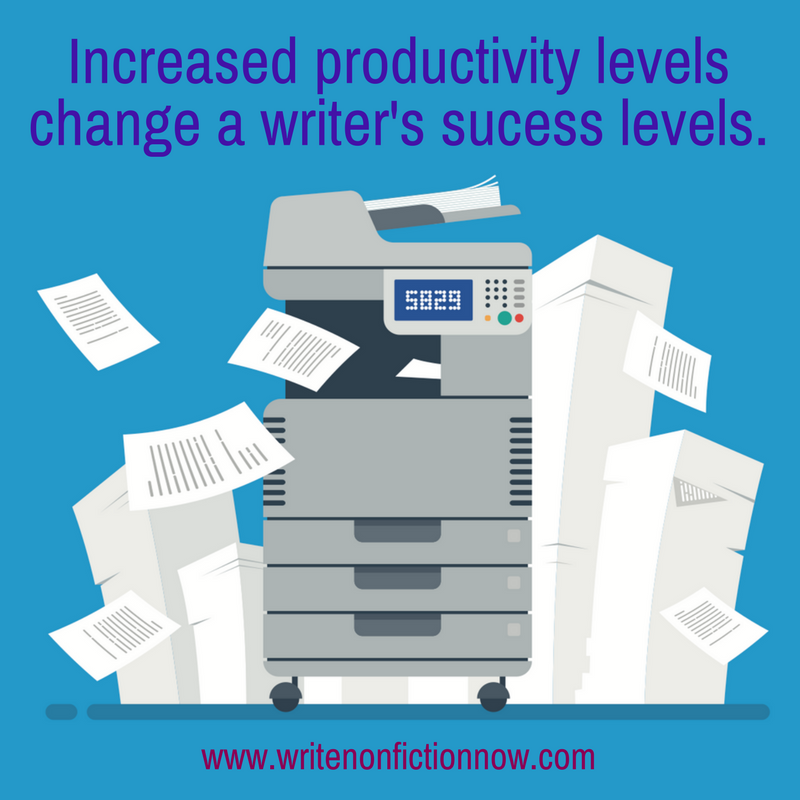 If you increased your productivity, what would that do for your success as a nonfiction writer and author? Imagine yourself producing five times as much written work per year (or per month). What would that mean for you? How would your life or career change?
If you increased your productivity, what would that do for your success as a nonfiction writer and author? Imagine yourself producing five times as much written work per year (or per month). What would that mean for you? How would your life or career change?
Could you write two blog posts per week? Might you send your literary agent five manuscripts per year? Would you turn in ten articles to publications?
With higher productivity levels, your writing income and platform levels would increase as well. Overall, your career as a nonfiction writer would level up equivalently. You could increase your level of success to five times more than you experience now.
That’s why this month I want to challenge you to find at least five ways to increase your productivity.
April Nonfiction Writer’s Challenge: Level Up Your Productivity
To increase your productivity as a writer, try putting the following three high-performance tips into practice.
1. Manage your energy.
Three types of energy affect your ability to be a productive writer: emotional, physical, and mental. To increase your productivity, you need to manage them all.
If you’ve ever had a day when you felt sad, depressed, anxious, or angry, you know how these negative emotions affect your writing. You probably felt lethargic, tired, unenthusiastic, dispassionate, distracted, hopeless, and unclear. And these states caused you to write slowly…if at all.
To avoid such unproductive days, learn to raise your emotional energy. You might spend five minutes listening to upbeat music (and dancing), meditating, doing breathing exercises, or giving yourself a pep talk. Find some way to switch your mood from negative to positive.
Your physical energy also impacts your writing. If you are tired or don’t feel well, you will struggle to write. That’s why you need to watch what you eat—and how specific foods make you feel (and write…or not write). If your typical lunch leaves you falling asleep an hour later, it’s time to change your diet, for example.
You also need to move your body regularly. Up your exercise routine (or start one). Stand up to write. Take a walk or do some yoga every 50 minutes. You’d be amazed at how much more writing you will do when you are in great shape and feel super physically.
Your mental energy follows suit with your physical and emotional energy. Get those in line, and you will find yourself with much more clarity, focus, and productivity.
2. Manage your attention.
When it comes to productivity, the ability to manage your attention is everything. If you are always distracted by social media, the news, the dog, your email, texts, or what to cook for dinner, you will write little if at all.
Although you do have to manage time, you also must manage your attention in the time you allot for writing. To increase your productivity, identify your most significant distractions. Then do two things: • Find ways to eliminate them. • Develop strategies to deal with them.
Most coaches focus on the first tip—eliminating distractions. But sometimes, that’s impossible, or you continue to struggle with them anyway. That’s when strategies come in handy.
What will you do when your kids ask for your attention during your writing block? How will you get yourself out of the email box or off a social media site when you find yourself there despite your best-laid plans?
Tweak your strategies until you find ones that work. Then watch your productivity levels climb.
3. Manage your time.
Managing time may seem like the most challenging task. After all, you’ve only got so many hours in the day, and they are all filled with non-writing-related tasks, right?
You have time to write. Stop saying you don’t.
The busiest people in the world make time to pursue their goals. How? They: • Prioritize • Schedule • Create urgency
If your writing is a priority, it must be your first (or close-to-first) task each day. To ensure you write, use a calendar, and schedule writing blocks on that calendar every day. Additionally, you need to give each writing project or goal a firm deadline. (Stop saying it’s not a real deadline if you set it. It is if you decide it is.)
With high and positive emotional, physical, and mental energy, increased focus, and a schedule that prioritizes your writing and includes the urgency of deadlines, you’ll discover that you can write more…way more…than before. You will become a highly productive and high-performance writer.
If the tips above don’t work for you, create your own productivity hacks. Either way, let me know the progress you make with this challenge. Leave a comment below.
 For more information on how to increase your writing productivity, join the Nonfiction Writers’ University (NFWU). You can join the Nonfiction Writers’ University for a $1 trial period of 30 days*! When you do, you get access to four years of great content housed in the NFWU as well as monthly educational events, virtual writing sessions, group coaching, and video trainings.*After the 30-day trial period you will be charged $37 per month for NWU membership until you cancel.
For more information on how to increase your writing productivity, join the Nonfiction Writers’ University (NFWU). You can join the Nonfiction Writers’ University for a $1 trial period of 30 days*! When you do, you get access to four years of great content housed in the NFWU as well as monthly educational events, virtual writing sessions, group coaching, and video trainings.*After the 30-day trial period you will be charged $37 per month for NWU membership until you cancel.Photo courtesy of Dim Tik